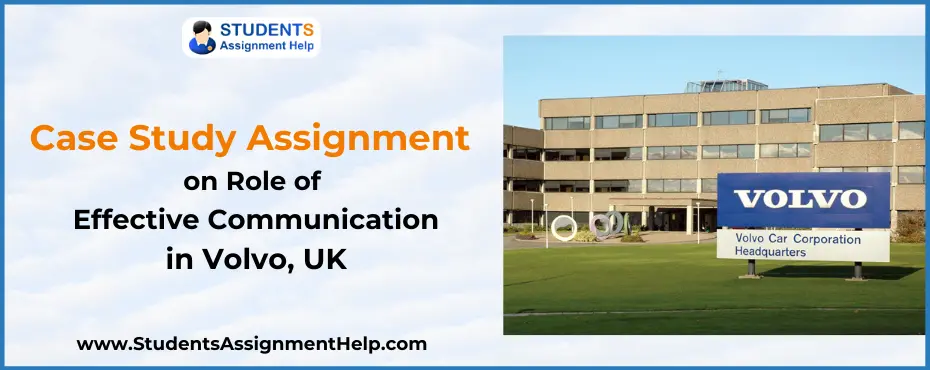Case Study Assignment on Role of Effective Communication in Volvo, UK

Introduction
The purpose of the paper is to examine the international operation of multinational corporation giant Volvo. The study will primarily focus on its automobile industry in Europe. The main objective of the study is to analyse the Volvo automobile industry in UK. As per European Report (2003), the credit for stimulating growth in Europe market globally goes to strong development and the automotive adjustment in the automotive industry. The Volvo has high competition in European market with 40 different manufacturers offering products (Economic Report 2003). In the given context, the PESTLE analysis of Volvo will focus upon areas such as the country environment, socio-economic culture, competitive condition and analysis of technology.
The PESTLE analysis will be helpful in identifying the future challenges for VOLVO UK. The analysis of the automotive industry in UK will help the company to build suitable strategies. The automotive industry is volatile and has huge potential for growth. The declining status of global climate has an effect upon international operation in Volvo. The paper also proposes recommendation for Volvo UK to meet the challenges in the market. The strategic advice on Product, Price, Place and Promotion will help the company to create a competitive advantage in UK.
Stuck with a lot of homework assignments and feeling stressed ?
Take professional academic assistance & Get 100% Plagiarism free papers
PESTLE analysis of Volvo UK
According to Bensoussan and his associates, it is important for Volvo to do PESTEL analysis of UK environment. The macro environmental analysis will guide the company in uncertain and dynamic environment. The macro environment provides the clear image of the changes in the external environment of the country and its effects on the operations of the company. The environmental analysis should be linked conceptually and practically with current planning operations. The success of the company depends on how accurately the decisions maker’s analyses and response to it. The six-macro environmental factors are Political, Economical, Social factors, Technological, Environmental and Legal factors (Besoussan and Fleisher 2012 pp. 187-189).
Political factors- According to Cavusgil et al. (2012) the political system is set of political institutions that constitute government. The political system establishes stability, rules and protection from threats. UK has a unique political system, which is embedded within a historical, cultural and ecological context. The political system of the country is dynamic and continually changing. The changing rules and regulation of government influence the international strategy and provides challenges and opportunities for companies (Cavusgil, Knight and Riesenberger 2012 pp.125-129).
As per McNeil (2005), UK is politically stable and safe country. The laws are comprehensive and fully implemented in the country. The government in UK has imposed high regulation on the automotive industry. The industry is facing huge taxation on trade. The increasing concerns over the environment around the globe have pressured the government to introduce stringent regulations for the automotive industry. The government has imposed strict regulation on carbon emission.
The rise in insurance prices and new safety regulation has affected the Volvo main markets in Europe. The government has also increased taxes for cars with higher carbon dioxide emissions. The state has adopted extreme tax policy to protect local automobiles. The subsidies provided by government are in the form of tax incentive, low insurance prices. It is a challenge for Volvo to produce low carbon emission cars (McNeil 2005).
Economical factors:- The rise in the fuel prices has affected the automobile industry and has declined the performance of the car company. The rise in price of oil has changed the consumer behaviour. The demand for fuel-efficient cars has increased.
Social factors:- As per Kotler et al. (2008) the social factors affecting environment are religion, custom, values and social organisation (Kotler, Armstrong, Wong and Saunders 2008 pp. 145-150). The major problem faced by automobile industry is changing consumer preferences from demand for luxury cars to fuel-efficient small compact cars. The reason for the shift in consumer behaviour is rise in fuel prices. The government is also providing subsidies and incentives to the consumer who buys eco-friendly cars in the form of free parking and road tolls.
Buy high-quality essays & assignment writing as per particular university, high school or college by UK, USA & Australian Writers
Technological:– Technological factors affecting automotive industry are rate of technology diffusion, new innovation and replacement of technology. Recently, government has taken initiative in UK for promoting new technology in renewable energy and creating electric vehicles (Success and failure in the UK car manufacturing industry 2007). Volvo had the competitive advantage in producing safety vehicles but failed to adapt with technological advanced features changes in the external environment. Toyota, the rival company of Volvo, has successfully adapted and implemented advanced features into product strategy. Toyota has capture the major market share by meeting the need of changing environment with producing fuel efficient, low carbon emission cars.
Environmental factors:- In UK, the big size cars increase the pollution by emitting carbon. Therefore, it has caused environmental problems such as polluting air. The government has taken serious steps to promote hybrid vehicles (SMMT 2013).
Legal factors:- The new laws pass by legislation on environmental protection have affected the automotive industries. The Clean Air Act passed by state has brought changes in the consumer preferences (Legislation 2013). Volvo focus is only on safety whereas the external challenges require reliable, eco-friendly and fuel efficient cars. The Flexi-fuel cars introduce by Volvo has not shown a good sign on the profits of the company.
Determining Volvo UK position in the market
The SWOT analysis will be helpful in determining how well Volvo fits in the UK market. The main strength of Volvo cars is on safety of environment and occupant. Hence, government policies on safety do not have much influence on the company. Zoan (2014) states Volvo UK has a strong focus on research and development. Volvo strength is in building on a talent for excellence. Volvo is globally recognised brand. The company has strong engineering capabilities.
Volvo has large dealer network. The company is weak in its product innovation strategy. As compared to its rivals, Volvo has done very less improvement and innovation in its products. In recent years, sales have declined. The company is unable to meet the requirements of customer for fuel-efficient cars. Volvo has immense opportunity to improve the performance of the company by penetrating into new markets. It is important for Volvo to understand the importance of performance, styling, eco-friendly cars other than safety aspects.
The competition in the automobile industry in UK is intense. Volvo has to face the challenge from its competitors: Toyota, Lexus (Zoan 2014).However, Volvo is strategically fit for UK market and undoubtedly improving its market shares in the country. In 2014, the company had registered a 20 percent increase in sales. The company has worked on the design; technology and luxury attributes of the car to meet the customer demand (Latest Volvo news 2014).
Market segmentation strategy of Volvo UK
Kotler et al (2008) explains that it is important for the company to understand the changing consumer behaviour. Consumer behaviour has influence on production, financial outcome and shareholder return. If company fails to understand the consumer behaviour, the sales of product decline (Kotler et al. 2008 pp. 150).
Mooij (2010) argues that the Volvo has appropriately segmented the product as per the buying behaviour of consumer. In UK, the consumer buying decision is influenced by many factors such as safety, design, joy to drive, car interior, environment friendly and engine performance. The other factors to choose the car are price and technology. The buying motives of the consumer are recognised in the design of Volvo cars. In UK safety, functional aspects of the car are given importance than technology or design. Volvo car brand in UK is recognised and well known for the safety attribute (Mooij 2010 pp. 170).
Volvo has segment the market considering the demographic, psychographic and behavioural differences of buyer. Volvo develops cars for the target market for whom safety of the automobile is a major concern while purchasing the product. Hence, Volvo has position its car as a safety product (Target markets and Segmentation 2014).
Assael (2005) argues that Volvo has reinvented itself through a strategy of market segmentation in UK. In the past, Volvo market segment strategy was focused only on the safety aspect. The company changed its market segment strategy as the sales of Volvo car shrink in UK. In the early 1990, to increase the sales the company reposition its marketing segmentation strategy suiting the needs of consumers. The company is repositioning itself as a comfort, sporty, fun mage without eroding its traditional message on safety so as to maintain a link with its core customers. As the punch line of Volvo car describes it is a safe and a family car who appeal to middle-class suburban families of UK (Assael 2005 pp. 535).
The current position of Volvo Company in UK
In 2014 Volvo car sales in March has seen a tremendous increase. The company has developed new and exciting models for almost every market segment. The bestsellers in Volvo car are XC90 known for its style, design, technology and luxury. The new V40 Cross Country is eye-catching package that cater to both rural and urban needs. The XC 90 is best among the Genre X customers. Meanwhile, XC60 has beaten all its rivals in UK. The initial months of 2014 have displayed a strong performance of Volvo UK. The company has an ambitious target of 20 percent increase in sale by the end of 2015. Volvo S60 and V60 has been awarded as Best Premium Car of the year by Fleet news.
The company has made low emission Drive-E engine that is available across all its model range, to maintain customer loyalty (Volvo builds on a talent for excellence 2014). Volvo is focusing on developing fuel-efficient and innovative electric cars to achieve its sustainable mobility mission without compromising on the luxury attribute of the car. Presently, the goal of Volvo cars is to sell cars to the luxury segment profitably. Volvo has deeply embedded the environmental care in the entire car lifecycle.
Volvo C30 is the first electric motor car that is driven by batteries and offers zero carbon emission. The company is successful in developing lighter and efficient D4 engine that promise zero carbon emissions (About Volvo 2014). In 2014, Volvo launched world first safety technology XC90 SUV. It is the latest launch from Volvo to realise the ‘Company Vision 2020’. The ‘Vision 2020’ aims that new Volvo will have zero injury and death of an occupant (Volvo announces 2014XC90 world first safety tech 2013).
Marketing mix of Volvo Cars UK
In order to understand the position of Volvo Cars Group in UK market, the marketing mix extends significant help for understanding the current strategy of the company in the market.
Product:- The Company offers a number of products in the car segment of UK. They include models S60, S80, V60, V70, V40, V40 cross-country, XC90, XC70, and XC60. The company launches its products by keeping in mind size and weight of the cars. The cars are big in size with high safety standards. The recent D4 engine is available now across all the Volvo range in UK. Apart from new cars, the company also deals in used cars (About Volvo 2014). Under Volvo Selekt, a customer can buy a used Volvo with an extensive warranty.
The used car comes with a package where it is made even better and advanced through application of latest software updates (Volvo Selekt 2014). Top-selling Volvo models in UK are V40, XC60 and V60. The major focus of Volvo for UK market is appeal to customers. It keeps on adding unique and new features to the already set and popular series models to capture the market share. For example, V40 model comes in three variations- V40, R-Design and Cross Country (Latest Volvo News 2013).
Young and Pagoso (2008) state that the product is the tangible element of the overall marketing mix. It comprises of three levels- the core benefit, the actual benefit and augmented benefit (Young and Pagoso 2008 pp.129-130). Volvo cars present the core benefit of driving with safety. The actual benefit is the quality features of the product, such as D4 engine, a premium hatchback, mileage, and accessories. The augmented benefit is the extended warranty the company gives to its UK customers for its used car service i.e. Volvo Selekt. Volvo Car Insurance and Volvo Car Financial Services are augmented features of the product the company delivers in the UK market (Business Sales 2014).
Price:- Harris (2007) states that Volvo UK aims at diversified buyers by offering a fabulous range of vehicles. It targets mid-luxury customers by offering luxurious cars with innovative features. The market penetration strategy will not be suitable for the company, as it will imply selling the same product in the same market at a lower price. It would increase the challenges Volvo is facing in terms of price rise of complementary goods and strict environment protection laws in UK. As the preference of UK customers has been changing from large engine luxury cars to fuel-efficient cars, reduction of price of cars will not help the company to raise its sales in the market (Harris 2007 pp.100-101, 116).
Place:- The Company has large dealership networks in UK. It sells its products through local dealers located in various parts of the country. Retailers for the company deal in various services, such as Volvo dealer, Volvo Selekt, Volvo new car sales, Volvo business centre, service and maintenance, and Volvo insurance under the same roof (Find a Dealer 2014).
Promotion:- Moutinho and Chien (2007) argue that Volvo Car UK sees marketing and promotion as more than a mere technical function. The whole company with managers at all levels are involved in the function. Two programmes of the company- Corporate Account Relationship Experience (CARE) and One Customer One Relationship (Oncore) are aimed at satisfying both business needs of the corporate customer and the human needs of the end-user/driver (Moutinho and Chien 2007 pp.138-139). It uses online advertorials and ambitious mobile promotions to promote its products (Volvo promotes C70 in online advertorials 2002). For instance, it launched an augmented reality driving game for Android and iOS platforms to promote the S60 sports sedan in 2012 (Volvo’s driving game promotes S60 2012).
Competitive advantage of Volvo Cars UK
The competitive advantage of Volvo Cars UK lies in its environment-friendly and safe car offerings. Total sales of cars rose up to 22% in September 2013 in comparison to the previous year. The overall sales went up to 2.6 percent in 2013. It is a mid-luxury brand but is not as expensive as BMW, Audi, and Mercedes-Benz. It provides its customers strong benefits through strong BIK (Benefit in Kind) figures, with a V40 D2 price at 43 pounds for 20% taxpayers and 85 pounds for 40% tax payers. These figures beat the figures of BMW and Audi (Latest Volvo News 2013).
The demand in the UK market is driven by quality and performance features of cars. High demand of premium S40 in UK is an example of how technology and performance features are driving the car segment in UK. Parry and Graves (2008) mention the strategy of ‘Built to Order (BTO)’ used by Volvo to control its inventory costs and link the mass production facility to demands from the customers. Quality, high safety standards and environment friendly features of Volvo cars have made the company create its niche in the car market segment (Parry and Graves 2008 pp.33).
Future in the UK market
Volvo Car UK Ltd. has been able to survive in the UK market due to its competitive advantage of safety and environment-friendly cars. However, customer preferences are changing with more focus on fuel efficiency, small cars with eco-friendly features and government incentives for small and eco-friendly cars. Due to direct competition with mid-luxury offerings from every large automobile player in UK, and direct competition from low-end models from BMW, Audi and Mercedes-Benz, the company has to focus more on product development strategy. By following the strategy, the company can adapt itself to changing consumer preferences that will help in the growth of the company (New Car CO2 Report 2014).
At present, Volvo is focused on producing cars with core elements of safety and environment-friendliness. With the production of cars that integrate not only safety, but also style and performance will lead to differentiation of company’s products from competitors’ products. Volvo 2020 vision is based on differentiation of both performance and safety of the environment. Introduction of hybrid fuel cars in the UK market is a positive step in terms of performance-oriented features of its products (About Volvo 2014). Recent addition of innovative features for S40 model in UK and its increased sale is a signal for the company to focus more on product development strategy (Latest Volvo News 2013).
Anderson (2012) presents the fact that the company adopted a strategy of merger with Geely Inc. to get the local experience in China (Anderson 2012 p.146). However, UK is the European market in which the company has a strong presence. Therefore, the company can use its strengths of strong customer orientation and optimize cost-efficiency and productivity to address challenges related to changing consumer preferences and becoming more technology and performance-oriented in the UK market.
References
About Volvo. 2014. [Online]. Available at: https://www.volvocars.com/uk/sales-services/sales/business-sales/Pages/default.aspx[Accessed on: 13 October 2014].
Anderson, G.E. 2012. Designated Drivers: How China Plans to Dominate the Global Auto Industry. New York: John Wiley & Sons.
Assael, H. 2005. Consumer Behaviour A Strategic Approach. India: Dreamtech Press, pp. 535.
Bensoussan, B. And Fleisher, C. 2012. Analysis without Paralysis: 12 Tools to Make Better Strategic Decisions. USA: FT Press, pp. 187-189.
Business Sales. 2014. [Online]. Available at: https://www.volvocars.com/uk/sales-services/sales/business-sales/Pages/default.aspx [Accessed on: 13 October 2014].
Cavusgil, S. T., Knight, G. & Riesenberger, J. R., (2012). International business, The New automotive industry: (I) mapping the current situation Realities. New Jersey: Pearson Education Inc, pp. 125-129.
Economic report. 2003. [Online]. Available at: https://www.acea.be./ACEA/ER0603-internet Version.pdf [Accessed on: 5 Oct 2014].
Find a Dealer. 2014. [Online]. Available at: https://www.volvocars.com/uk/retail/Pages/default.aspx [Accessed on: 13 October 2014].
Harris, N. 2007. Business Economics: Theory and Application. London: Routledge.
Kotler, P., Armstrong, G., Wong, V. and Saunders, J. 2008. Principles of Marketing. Edinbugh Gate: Pearson Education Limited, pp. 945-950.
Latest Volvo News. 2013. [Online]. Available at: https://www.volvocars.com/uk/top/about/news-events/pages/default.aspx?itemid=201 [Accessed on: 13 October 2014].
Legislation. 2013. [Online]. Available at: https://www.legislation.gov.uk/ukpga/1993/11/contents [Accessed on: 15 October 2014].
MacNeil, S. 2005. Trends and drivers of change in the European automotive industry. Automotive Technology and Management, 5 (1 ), 83-106.
Mooij, M. 2010. Consumer Behaviour and Culture: Consequences for Global Marketing and Advertising. USA: Sage Publications, pp. 170.
Moutinho, L. and Chien, C.S. 2007. Problems in Marketing: Applying Key Concepts and Techniques. London: SAGE.
New Car CO2 Report. 2014. [Online]. Available at: https://www.smmt.co.uk/co2report/#responsiveTabs1 [Accessed on: 13 October 2014].
Parry, G. and Graves, A.P. 2008. Build To Order: The Road to the 5-Day Car. New York: Springer Science & Business Media.
SMMT. 2013. [Online]. Available at: https://www.smmt.co.uk/industry-topics/environment/intro/ [Accessed on: 15 October 2014].
Success and failure in the UK car manufacturing industry. 2007. [Online].
Available at:
https://www.publications.parliament.uk/pa/cm200607/cmselect/cmtrdind/399/399.pdf [Accessed on: 15 October 2014].
Target markets and Segmentation. 2014. [Online]. Available at: https://www.gpglobalcy.com/default.aspx?articleID=1188 [Accessed on: 13 October 2014].
Volvo announces 2014XC90 world first safety tech. 2013. [Online]. Available at: https://www.carmagazine.co.uk/News/Search-Results/Industry-News/Volvo-announces-2014-XC90s-world-first-safety-tech/ [Accessed on: 13 October 2014].
Volvo builds on a talent for excellence. 2014. [Online]. Available at: https://www.telegraph.co.uk/sponsored/business/volvo-business/10793439/volvo-automobile-innovations.html [Accessed on: 13 October 2014].
Volvo promotes C70 in online advertorials. 2002. [Online]. Available at: https://www.marketingmagazine.co.uk/article/144844/volvo-promotes-c70-online-advertorials [Accessed on: 13 October 2014].
Volvo Selekt. 2014. [Online]. Available at: https://www.volvocars.com/uk/sales-services/sales/volvoselekt/pages/default.aspx [Accessed on: 13 October 2014].
Volvo’s driving game promotes S60. 2012. [Online]. Available at: https://www.cnet.com/uk/news/volvos-driving-game-promotes-s60/ [Accessed on: 13 October 2014].
Young, F.C. and Pagoso, C.M. 2008. Principles of Marketing. Manila: Rex Bookstore Inc.
Zoan, NG. 2014. Finance – Professional Essays and Assignments. Australia: Zoan NG.






